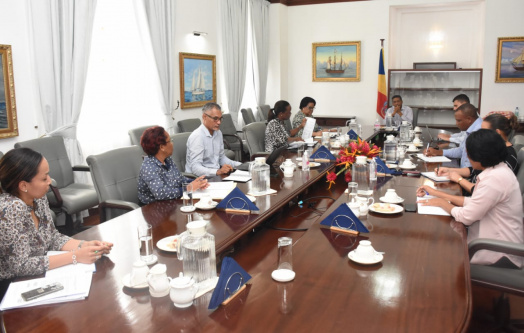
President Danny Faure chaired a meeting with key representatives of government, Project Manager for Seychelles’ Employee Transition Scheme (SETS), Mr Guy Morel, and National Coordinators for the National Workers’ Participatory Programmes at State House this afternoon.
The National Workers’ Participatory Programmes will allow individuals working with SETS to support outstanding Government projects in four areas outlined below. It will not include work usually tendered out to private sector, and it will not include work that has already been budgeted.
To recall, SETS is the Seychelles Employee Transition Scheme, a company to facilitate retraining, up-skilling, and temporary work placement services for those made redundant, supporting re-entry into the labour market as job openings become available whilst providing financial support. Staff on the payroll of FA4JR (Financial Assistance for Job Retention) recipient entities will also be eligible to avail of the opportunities under SETS, including the National Workers’ Participatory Programmes.
The meeting this morning announced the National Coordinators for the National Workers’ Participatory Programmes. National Coordinators are responsible for identifying potential economic activities to engage those made redundant under four main categories of work:
Special Public Works Programme under the responsibility of Mrs Dotty Raforme. This will look to maintain labour-intensive infrastructure work that had previously been neglected. It will not include maintenance and construction work currently in the Budget to be tendered out to contractors.
The Community Works Programme under the responsibility of Mrs Raymonde Benstrong.This will look at projects taking place at the local or community level, which directly impact families within a district. This can include work such as painting bus stops and clearing footpaths outside the purview of the Landscape and Waste Management Agency. This will not include maintenance and construction work currently in the budget to be tendered out to contractors.
Supporting Public and Social Institutions under the responsibility of Ms Susan Morel. This programme will look at projects required under the ‘new normal’ and opportunities to innovate as a result of the pandemic. Examples include transitioning to e-government and reducing dependence on paper, new processes in educational institutions, and new protocols for health institutions. This will include “one-off” projects for certain Ministries and Departments previously lacking manpower, such as digitising records. This will not include works usually tendered out to private sector, and it will not include works already budgeted.
The Environment Programme will be under the responsibility of Mr Denis Matatiken. It willlook at projects to address national environmental concerns such as climate change adaptation and mitigation, and ecosystem restoration. Some of these concerns arise directly from the high number of visitors to the country, and the absence provides a unique opportunity to carry out this works by minimising opportunity costs. Some projects will be possible as a direct result of expanded manpower, such as removing invasive creepers from National Parks. This will not include works usually tendered out to private sector, and it will not include works already budgeted.
The National Coodinators will be responsible for the enrolment of participants on their respective programmes by liaising directly with SETS. The four programmes will compliment exisiting placements being targeted in the private sector as well as the retraining and upskilling programmes.
A follow-up meeting will be held in the first week of July.
Also present for the meeting at State House this afternoon was the Minister for Employment, Immigration and Civil Status, Mrs Miriam Telemaque, the Economic Advisor to the President, Mr Bertrand Belle, Special Advisor for Employment, Ms Veronique Bresson and the Director General for Employment Promotion, Mrs Letimie Dookley.